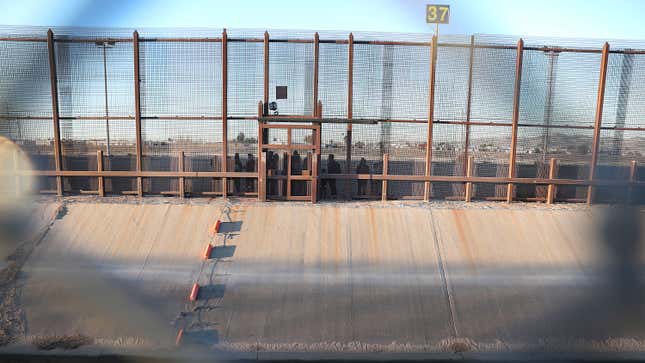

Donald Trump, who speaks primarily in soundbites or non-sequiturs, has recently attached himself to a new catchphrase about immigration: the United States is “full.” “We can’t take you anymore. We can’t take you. Our country is full,” he said earlier this month while visiting the U.S.-Mexico border. He repeated the phrase again while speaking before the Republican Jewish Coalition in Las Vegas that same weekend telling the audience: “Our system’s full; our country’s full. You can’t come in. Our country is full. What can we do? We can’t handle any more. Our country’s full. You can’t come in, I’m sorry.”
The Democratic response was surprisingly muted, with the strongest condemnations coming from newer and lower-profile members of the House. Representative Pramila Jayapal described it as a “ridiculous statement.” Representative David Cicilline wrote that the president’s remarks “more than anything else he’s ever said, are how [Trump’s] terrible presidency will be remembered by history.”
These kinds of quick statements are by now familiar: Since the start of Trump’s campaign in 2015, the Democratic Party has been quick to define itself in opposition to his rhetoric and policies, particularly when it comes to immigration. Leadership has broadly denounced his attacks on sanctuary cities, the inhumane treatment of children and families at the border, and general cartoon-level xenophobia. It’s on the specifics that the matter gets more complicated. On the same weekend that Trump was once again parroting the rhetoric of far-right nativists, statements by two leading Democrats highlighted a truth that has become increasingly obvious under the current administration: Democrats have an immigration problem, too.
At a recent campaign event in Iowa, Senator Bernie Sanders, currently a Democratic frontrunner for president, was asked whether he supports open borders, an idea that has long been used as a rightwing cudgel but is now gaining some traction on the left. “I think what we need is comprehensive immigration reform,” he said, before going into his rationale for not opening our borders—a position that sidled uneasily up to Trump’s comments. “If you open the borders, there’s a lot of poverty in this world, and you’re going to have people from all over the world,” Sanders replied. “And I don’t think that’s something that we can do at this point. Can’t do it.” Last week, at his Fox News town hall, Sanders reiterated the need for both immigration reform as well as border security: “We need border security, of course we do, who argues with that? That goes without saying. I happen to believe there are more cost-effective ways to do that than a wall.”
In Berlin earlier this month, former president Barack Obama also addressed the issue of migration, framing anti-immigrant sentiment as a problem that both racists and immigrants have a responsibility to address. Telling his audience that “we can’t label everyone who is disturbed by migration as racist,” Obama continued:
“Should we want to encourage newcomers to learn the language of the country that they’re moving to? Of course. Does that mean that they can never use their own language? No, of course it doesn’t mean that, but it’s not racist to say, ‘Ah, if you’re going to be here then you should learn the language of the country that you just arrived at because we need to have some sort of common language in which all of us can work, and learn and understand each other.”
Obama’s speech echoed his general ideological posture—that immigration reform requires reaching out across the aisle and, by necessity, must include not only a (difficult) path to citizenship for some undocumented immigrants, but an increase in border security. It’s a stance that Democrats have championed at least since Bill Clinton’s tenure in office. The idea that legalization must be coupled with efforts to make the border a fortress was put into action by Ronald Reagan, whose 1986 Immigration Reform and Control Act packaged these dual objectives together.
Since then, most major bipartisan efforts have kept this framework in place, and have often been even more punishing than what was championed by Reagan. This was the case in 2007 under then-President George W. Bush, and the case in 2013 under Obama, when efforts to pass immigration reform bills ultimately failed largely due to Republican obstruction (and in 2007, to many Democrats’s as well as organized labor’s ambivalence towards some of the reforms). This conservative idea—heavy enforcement with an arduous path to permanent resident status or citizenship for some—repackaged as bipartisan immigration reform is what I imagine Obama meant when in Berlin, he called for “a humane, intelligent, thoughtful, orderly immigration policy that is grounded in our better selves and our better values,” and what Sanders, who supported the 2013 bill, referred to when he spoke of “comprehensive” immigration reform.
“Most Democrats are afraid of being accused of being ‘soft’ on security,” immigration historian and Columbia University professor Mae Ngai told Jezebel over email. “Hence they remain committed to the model of ‘comprehensive immigration reform,’ which is not really ‘comprehensive’ but a trade off between legalization and enhanced border security.”
During the last two years, Trump has made it easy for Democrats to say what they don’t want—a border wall, or a Muslim ban, or for children to be ripped away from their families, or tent cities for immigrants, or for any people to be dehumanized as “animals.” But Democrats have been much less forthcoming about what they want in a comprehensive immigration platform. When they manage to articulate a clear position, it is often a regurgitation of the same, punitive status quo—a status quo that has harmed millions of people, who today face the daily consequences of the current system.
-

-

-

-

-

-

-

-

-

-

-

-

-

-

-

-

-

-

-

-

-

-

-

-

-

-

-

-

-

-

-

-

-

-

-

-

-

-

-

-








































